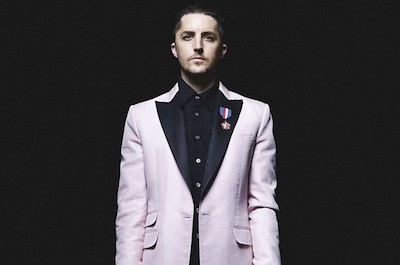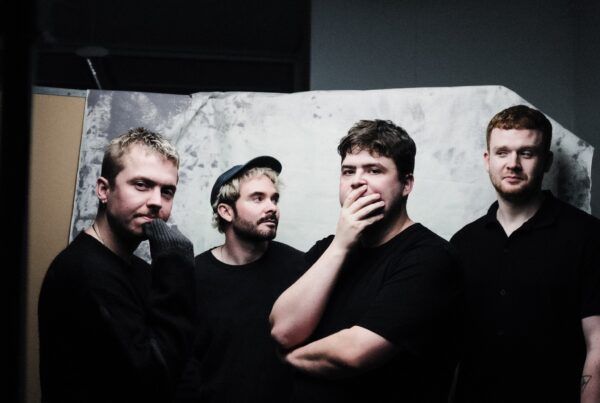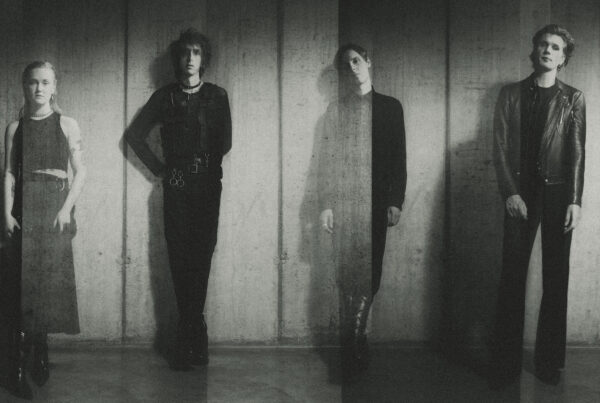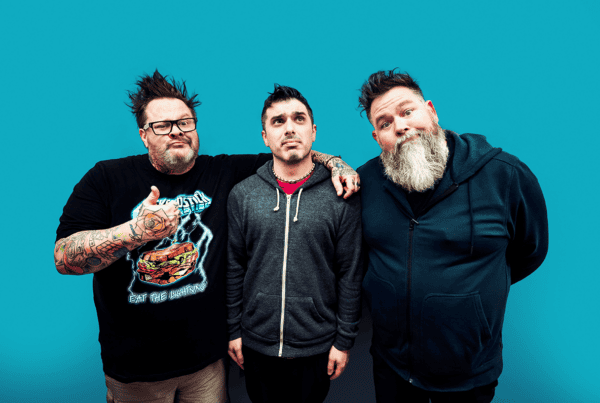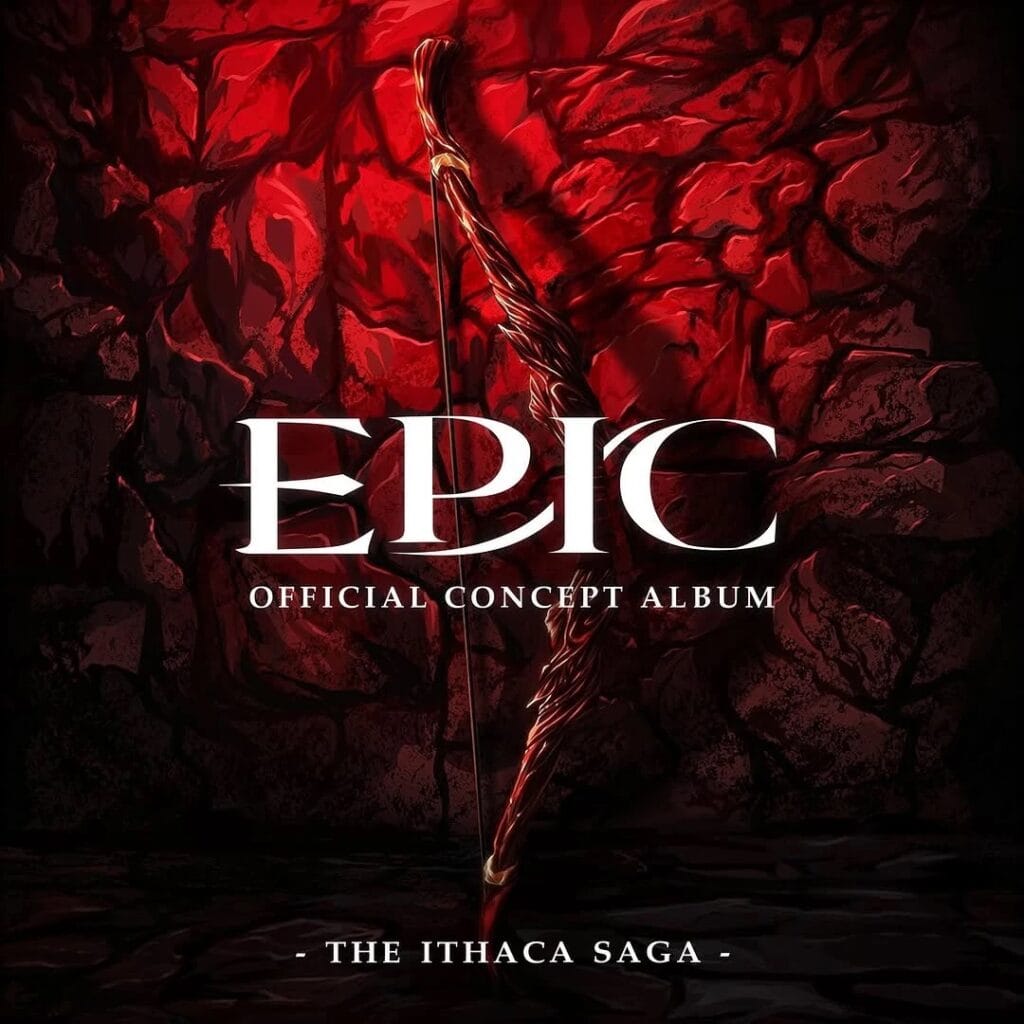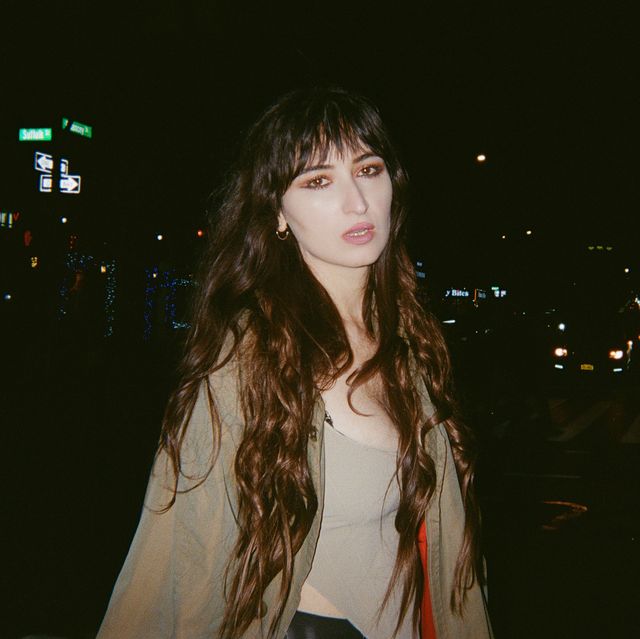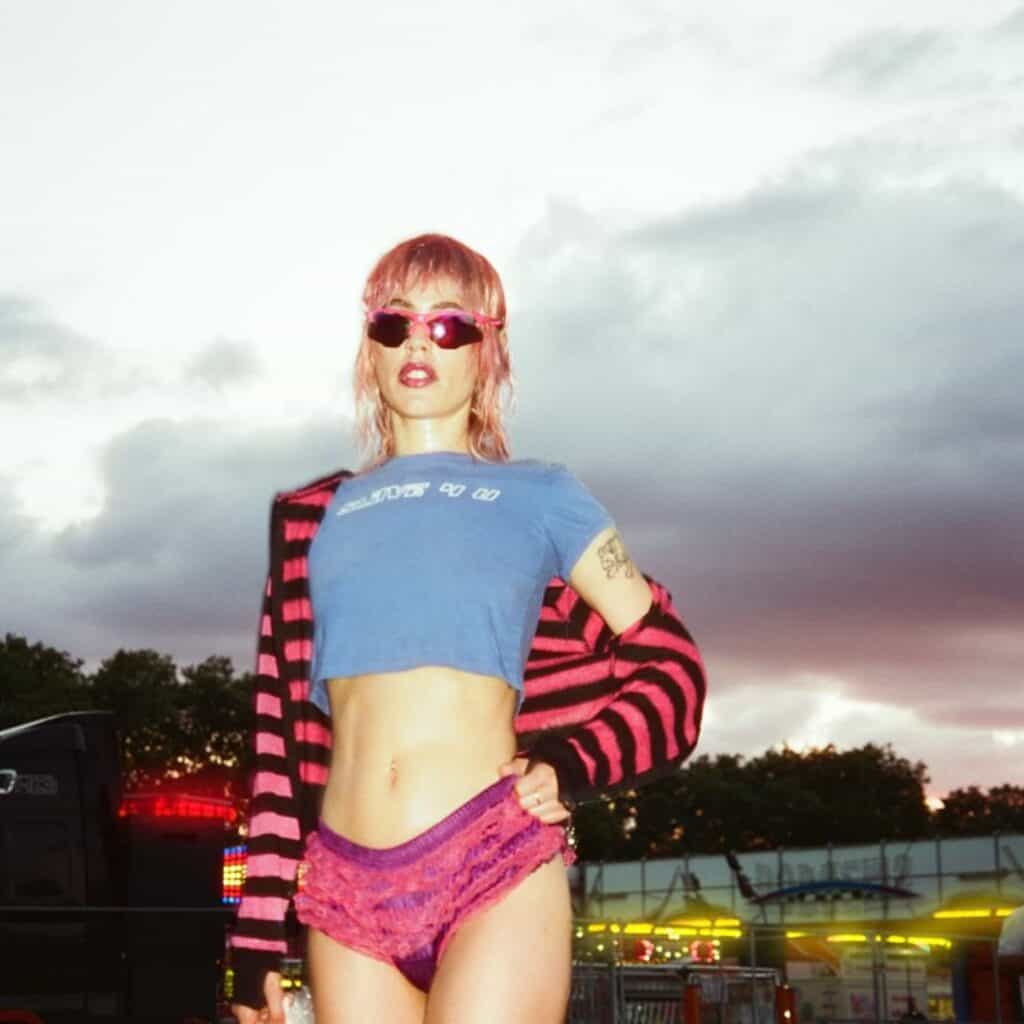A little while ago, we had the chance to chat with Mat Devine of Kill Hannah about his latest solo project, Wrongchilde. Mat talks to us about his evolution as a musician, his inspirations outside of music and Wrongchilde’s debut album, ‘Gold Blooded’.
[like_to_read][/like_to_read]
S] How does this solo project, Wrongchilde, push you in new ways as a musician from Kill Hannah?
M] “It’s interesting because I’m not a really good musician and in the past I got lazy with Kill Hannah because I was surrounded by really talented people, so my guitar skills got super-sh*tty. This is interesting because I almost had to re-learn how to play acoustic again. I should take it back because one of the first reasons why this record even began was because I got an offer to play an acoustic show in New York and I started writing this e-mail back saying ‘No, there’s no way, how on earth do you expect me to do that?’ and as I was writing that I was thinking, I’ve been in a signed band for years. I’ve been touring. If I can’t go play an acoustic show, then what the hell is the matter? So I agreed to the show and in the process I started re-loving the guitar and taking a look at songs that I could actually perform alone and songs that mattered to me outside of the normal catalogue and it reawakened something. I started writing a lot more and then when I committed to it, it was a total commitment because then I moved to LA because that was where the studio was. I gave up my apartment in New York and the process of doing that and showing up in a place where the climate is totally different, totally different friends, totally new environment, that day I landed was when the name ‘Gold Blooded’ came to mind and that’s when that song was written and then everything from there was just focussed. Not just in musicianship because I’m still not a great musician, but in terms of songwriting it was like ‘What if this is the last thing I ever write?’. I kind of want to say something, I want to be so honest that it’s like love it or hate it, at least this is what I can contribute in a small way to the world of music.”
S] What were the challenges and highlights of collaborating with other musicians for this record?
M] “It just felt right. There were technical challenges, we wanted to break habits. Maybe this relates to a lot of different artists like filmmakers or painters. You spend your whole life trying to learn the rules, trying to master the formula. When I first started, the first thing a producer would say is ‘You can’t have a seven minute song, you’ve got to cut this down’. Then they’d say choruses are supposed to be bigger and lyrically you’re supposed to relate to everyone. You start refining your craft to the point where it’s still you but you’re playing by everyone else’s rules. One of the challenges for me was to rethink everything. As trivial as it sounds, you have a chorus of a song; it’s just a conclusion that you’re going to go to the ride cymbal on the drums or you’re going to put on the distortion peddle like Kurt Cobain. Everyone of those choices in the studio, it was our challenge to re-think it. If there was a song that was six minutes long, it was six minutes long. The first song on the album doesn’t have a chorus or a verse, it’s just a linear song where it just repeats the same phrase like eleven times. That was a challenge just to re-think everything. The highlights were just getting to the studio. There’s a love of the process that I have where you have the whiteboard out and you’re checking things off and you can see the album taking shape. The process of it itself was a highlight. Just driving every morning and knowing that you’re going to work on something that you love and being in California. I’m a New Yorker, when I came out here it was exactly what I needed at the time. Leaving the greyness of New York and then suddenly there’s like a parrot in a tree. And then you realise ok, there’s a sh*t ton of evil in this city and there’s darkness here and not quite the culture of New York, and all the stereotypes. I’ve acclimated to it, but I’m like the whitest person in this town and I’ve only been to the ocean once in a year-and-a-half. But at the time it was exactly what I needed. It was a fresh start and it was inspiring. There’s something about it being 75 degrees at night. I like it for a lot of different reasons, but I’m from Chicago and NYC and I identify as more of a person with those cities. Also with highlights, all those collaborations were huge highlights.”
S] What was the process of developing ‘Falling in Love Will Kill You’ and collaborating with Gerard Way?
M] “That one was interesting because it was just strictly an acoustic. It was traditional chords. My favourite guitar player would probably be Robert Smith. He’s not a technical guitar player, he would do a lot of stuff on single strings and I always thought it was melody based rather than technique and his use of pedals. When I started when I was 15 I bought all the pedals that he had, the phaser the flanger, they’re still the ones that I use. What made ‘Falling In Love Will Kill You’ special was that I was on an acoustic guitar and I was playing chords like a normal person and to me it almost sounded like an Americana song and it didn’t sound like me at all. I never even presented it to Kill Hannah. To me it felt like an Elvis song. It was just the mood and a matter of fitting the sentiment into the sad key that the song is in. Lyrically, you reach a point and spend your whole life wanting to fall in love and then I reached a point in my life where I was like, everything that comes with that I don’t know if I want it anymore. As an adult you get to a certain point in your life where you’re not looking for some external being to fulfil your life.
I’m centred, I feel like I’m at harmony with the universe and the minute you let someone in you’re at risk and there’s someone that can destroy you. We’ve all seen the power of love, not to be cheesy, for it’s destructive and constructive forces. To me, heartbreak and loss is the greatest pain in the world and whether you’re the one experiencing it or you’re the one that caused someone to experience it, it’s worse than any physical pain there can ever be. I’d rather almost anything happen physically than that. That’s what that song touched on in terms of subject matter. Gerard was in town working on new stuff and he happened to be in the same area of LA which was really cool and I told him I’d love for him to come by the studio so I could play him what I was working on and hear what he was working on. He was generous and cool enough and came over one day and we listened to what he was working on and I was blown away. When we were in the studio I told him I have a song called ‘Call Me Crash’ and I said, ‘There’s an opportunity for distorted vocals and I feel like it might be something that would be so cool with your voice’.
We started listening and we played the idea for ‘Falling In Love Will Kill You’ and he was like ‘I want to sing on that one.’ It was a dramatic choice and bold choice because it’s two guys. For me it wasn’t an immediate thing and of course, he’s such an open minded, liberal, artsy guy. He’s the last person on earth who would be afraid of breaking rules and even now as we talk about it, it’s like, ‘What a choice for two guys to sing a love song.’ It was more of a question, how come other people aren’t doing this? Of course, ‘Under Pressure’ and ‘Dancing In The Streets’ by David Bowie and Mick Jagger. It was funny that we couldn’t think of any acoustic songs like that. The minute he started singing on it, it just felt perfect.”
S] On the record is there a song that you feel defines where you are at your life now?
M] “The opening track on the record is ‘Birds Of Prey’ and to me that’s just me, unfiltered, being me. You can hear my record collection. It’s a short song and it’s an unlikely song and you can hear early Cure, Pixies and then at the same time, Fever Ray and current bands that are doing really tasteful, arty things. And lyrically it’s a phrase that repeats. It’s not trying hard at all, there’s no way you can call it a sellout in anyway. Not that I care about that argument. I think it’s the equivalanet of a chef, what defines you. Maybe it’s just a peanut butter sandwich, but he chose to do something different. Maybe it’s not like a crazy flambe, maybe I just decided to mix a little bit of honey in the peanut butter, that’s what that song feels like to me.”
S] Are there any plans for Wrongchilde to come over to the UK?
M] “We’re talking about coming over. I’m talking to the radio over there and I really want to get one of the tracks to Zane [Lowe] or Annie Mac or anyone and we’re having those conversations now. Is it better for them to play the song now, or is it better to play closer to when we come? Logistically I can perform alone or we can do the full band and the full band is a full volume rock format. We have a synth player, full drummer, guitars and basses and we put out the volume of any larger rock band and the vibe of the songs is more inward.”
S] You’ve always been in touch with the fans and take advantage of different opportunities. Do you find there are more opportunities that come to you in LA, more of a chance to network than you did when you were in NYC?
M] “Musically, like it or not it’s all out here. I love the fact that Kill Hannah came from Chicago. I love that we’re not just another LA-based band. That defined us, the fact that we lived in a freezing cold city where there weren’t a ton of other bands like us and it forced us to work our asses off. Now starting a new band, the industry is out here. It’s much more sensible to be in LA in terms of the labels, the publishing, the TV. This is definitely where the industry is. The amazing thing is too, what separates the people that make it from the ones that don’t, and I’m not saying I made it, but I still have a work ethic from Chicago and maybe that’s from New York too. I work hard. People love the idea of being in bands out here, but very few people are willing to do the work it really takes. In terms of starting a band it’s ugly, it sucks, it’s hard and it’s expensive. And people might love being in a video or a photoshoot but they don’t love carrying their amp down three flights of stairs to practice a part that they hate. I believe that LA becomes a very small world of the people that are willing to do the work.”
S] What inspires you outside of music?
M] “I’m so curious about everything. I go to bed every night watching Youtube videos about the Illuminati. I watch atheist debates with Christopher Hitchens. A guy named Sam Harris. I experimented recently with ayahuasca, which is a hallucinogenic, it’s a ceremonial Amazonian cleansing thing. I’m more meditative. I’ve watched every Anthony Bordain video, people that travel the world. I love learning new sh*t. Travel and new foods and new things, those things inspire me. As silly as it is, a new restaurant, a new wine that maybe I’ve never tried. Mainly I want to learn more about the world. I have a bucket list. I’ve never been to Istanbul, Mearrakech, Africa. Those things are inspiring to me. Any articles I can read or videos I can watch and conspiracies of course. I just watched a video that said JFK Jr. was likely assassinated, that the plane crash wasn’t accidental. I fall asleep to a different conspiracy theory every night, but then I’ll see if there’s anything to debunk it as well. There’s a great video out there called ‘Ancient Aliens Debunked’, which is a four-hour video debunking point by point all the ancient alien theories that were mentioned in the Ancient Aliens series. I’m watching videos by this guy named the Amazing James Randy who is this really old magician who now spends his life debunking mystics and psychics and supposed paranormal stuff because I just want to know how the world really works. Also Neil DeGrasse Tyson, he’s an astrophysicist and anything he puts on Youtube I watch. I’m a one million percent evidence based cynical atheist, but at the same time I believe we’re living in a computer simulation. So those are the things that inspire me right now.”
S] You’ve gone for pledge music with your new album. What has it been like to put your faith in fan support and bringing the fans in to help you make the album?
M] “It’s something that people recommended to us. The minute Kickstarter started they said we were ideal for it. I was very late to the game. I always thought that crowdfunding had an overall tone of desperation and I never like the tone of saying we need you for anything. We’re very one-on-one for our fans and we’ve always operated slightly outside the system because we depended so much on our fans more so than traditional means of promotion and marketing. At the same time I hated the tone of ‘hey we used to have money and now we don’t, let’s work together’. But the cool thing with pledge was that was the first platform I saw where I could brand the campaign in a way where it didn’t look like I was asking for anything. It’s a store front where you can pre order the album here and pre order any sort of merchandise or anything you might like. The album has already been created. We already spent a significant amount of money making the album, now I want to bring it to you guys without the gestapo system that’s out there. I want to make it more democratic and bring it directly to you. Because pledge allowed me to brand it that way and design the interface that way, I really went for it and had a great experience with it.”
S] What are your plans for the future?
M] “Mainly it’s about the release and then we’re talking about staggering the UK release and including two bonus tracks. I really want to hit the UK soon and maybe Paris and right now it’s the focus on the radio campaign here and syncs and licensing. Thankfully the people we partner with hear the songs being in good movies and good moments in TV shows, that’s our focus. There’s also big focus I have on rehearsals every day. Starting a new band is so much harder than I thought it would be. You’re talking about five people, five different personalities. No matter how committed everyone is, people have personalities and it’s a marriage. It took Kill Hannah six years to agree on an official lineup. This had to be put together in a month and I really lucked out. But now it’s a matter of the logistics and the tech side of it. It’s really DIY. It’s awesome, I was dreading it because of the thought of getting a rehearsal space and learning all the songs again. Then the minute I had my first session with the bass player, a guy named Jeffrey, and I heard the songs with live bass I was so relived and excited. Now I’m ready to start booking shows and have people see it.”
S] You’ve had a journey as a musician with Kill Hannah and are now starting a new chapter with Wrongchilde. How do you feel you’ve developed over the years as a musician?
M] “It’s two things at the same time. I’m really sh*tty at growing up. So what I’ve learned is that the world of music is a great place in the sense that it’s an island of Peter Pans. I stay young and fired up. I still bitch about the same things, I still care about the same things, I still relate to youth culture in the same way. I don’t feel like ever losing any of that, but musically I want to evolve and I want to look back and push myself to do stuff that ages well, that matures and that people don’t outgrow. That’s what’s wonderful about art, the tools are always there. I can pick up an acoustic now and just sit on the porch and challenge myself to do something better than I‘ve ever done and have more of an impact emotionally than the loudest guitar chord and the biggest drums and the most produced things ever.
I had a guitar in my old apartment that was there when I moved in and it was missing two strings. Instead of stringing it up I started playing with just the strings that were left and it created this new song that, to me is one of the most special things I’ve ever done. What I’ve learned is that you never have to plateau musically. I’ve also learned to trust your instincts, as cliché as that is. When I first started writing music my favorite bands in the world were Catherine Wheel, Suade, Slow Dive and The Cure. I had to apologise for the first 10 years of my musical career that I wanted to use synthesizer.
I didn’t want it to sound like garage rock. I wanted it to sound like something lush and emotional and English, and in Chicago that was uncool and that’s not what was ever played on the radio. Even sound guys at clubs, if they saw you trying to use a keyboard they made fun of you to your face. Slowly the world changed and now it’s cool, but I think back to how much I evolved unnaturally to answer to the outside pressures and it’s fun that I can look back and say now I’m doing what I wanted to do the whole time. It’s this lesson to me that the world will change and taste makers will come and go, but who gives a fuck? Stay true to you. If deep in your heart you love Nordic death metal then make Nordic death metal. What’s cool is someone doing what they really love. People come around and give you respect if that’s what you do. My musical evolution over my whole career is half-and-half; Me really proud and me slapping my forehead looking back on moments. I did a writing session with Forest Whitaker’s daughter, named Sonnet and she is a 15 year old prodigy. We were writing these songs and I asked what one song was about and she said ‘it’s a song about spiders’ and I said ‘perfect, don’t change a thing’. I’m not going to be the person who tries to tell someone that a song about spiders might not be on the radio or get a record deal. I think musically the coolest thing in the world is the quest to retain anything that’s pure and individual about you, about the artist. Something that you do that not everyone else is doing. It’s awesome now that with the landscape of the music business you get rewarded for being yourself”.

